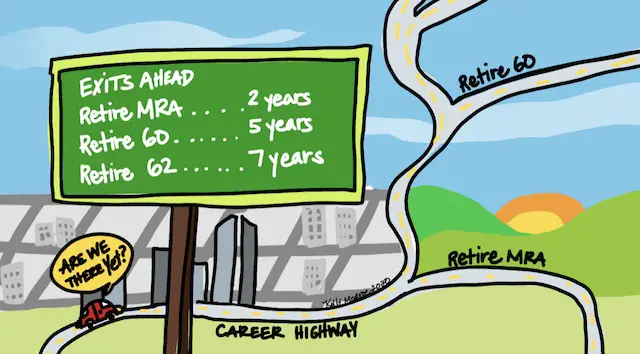One key difference that I have seen between federal employees and those on the private side is how they think about retirement. Private sector employees generally ask, “When can I afford to retire?” Federal employees, on the other hand, more often ask the question, “When am I eligible to retire?”
As we all know, thinking about pension and benefit eligibility is very important but it is not everything. You may be eligible for an immediate retirement at age 60, but do you want to stay at your current job until then? Do you want to retire early or maybe go take another job somewhere else? Can you afford to retire at 60 or should you work a couple more years, or maybe you can afford to retire way before age 60? The federal retirement benefits are incredible and should not be ignored, but the rest of your life and goals should not be ignored either.
If early retirement is your goal, financial independence is much more important than just clocking 20 years. In a nutshell, financial independence is the ability to not have to work for money.
When people ask if they can afford to retire, they are really asking about their financial independence. In other words, if I stopped working today, would I have enough income from other sources to provide for myself and my family?
The best part is that most people can become financially independent before age 61 (the average age for federal employees to retire) because when you really think about it, financial independence is pretty simple. It is just a matter of earning enough from investments, pensions, and other sources to cover your expenses. It is a simple math equation, but as we all know, simple things are not always easy.
How To Reach Financial Independence: Make A Plan
Everyone’s life is different. Everyone has different needs and different goals, and everyone’s journey to financial independence looks a little different as well, but financial independence does not happen by accident or overnight. You need to make a plan to get there.
I would start with your goals and by asking some of these questions: Do you like your job? How long would you like to keep working? If you were able to stop working today, would you? What would you do with your time if you retired?
At this point, it is important to remember that being financially independent doesn’t mean that you have to stop working, but it does mean that you have the ability to do whatever you’d like.
You can work on a side project, get a part time job that you enjoy, or just do hobbies. Some people get uncomfortable with retirement because they think that it means doing nothing. The beauty of financial independence is that it can mean whatever you’d like it to. Some people reach financial freedom but still stay at their job because they enjoy it.
Once you have an idea of your goals, you’ll need to come up with an action plan on how to get there. This could include investing more in the TSP, cutting some expenses, or starting a side hustle (or all three). Whatever you choose to do, be realistic and stick to it. Monitor your progress over time and make adjustments as needed.
MRA (Minimum Retirement Age)
This is often the elephant in the room when I talk about early retirement for federal employees. Depending on the year in which you were born, your minimum retirement age is between age 55 and 57, but the good news is that many people retire before their MRA either with an “Early-Out” retirement or a deferred retirement.
Just know that for every type of retirement (deferred, postponed, immediate, MRA +10, etc), there are pros and cons and often dramatic differences in benefits. For example, an MRA +10 retirement has a reduction to your pension for every year you retire before age 62. That being said, no type of retirement is inherently better than others. Some types will pay out more benefits but they often require more years of service and that may or may not align with your goals.
The purpose of this article is not to give you the perfect blueprint for early retirement because as I am sure you have guessed by now, there simply isn’t one.
I hope this article reminds all of us to question the status quo and to remember that just because the average fed retires at age 61, that doesn’t mean that we have to as well, but there is nothing wrong with working until 61 either. The trick is to forget what other people are doing and focus on what makes sense for you. Make a plan and then work hard to get there.





